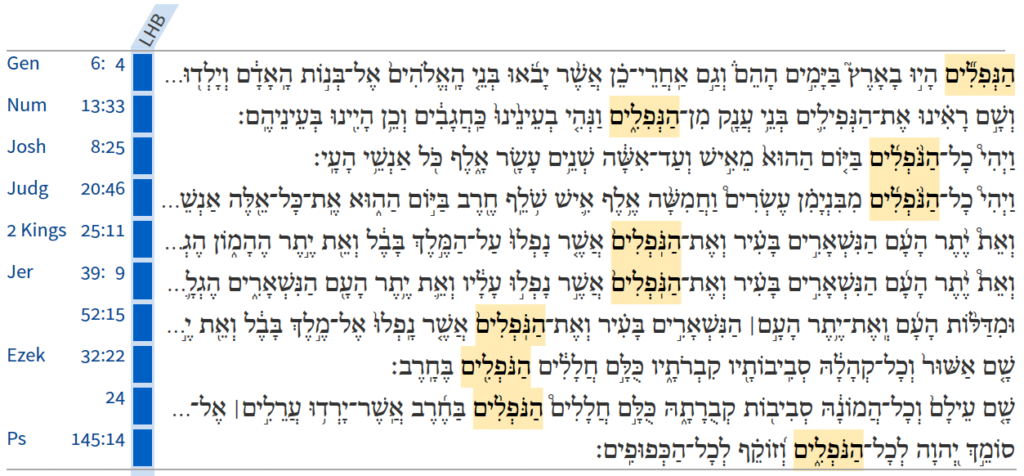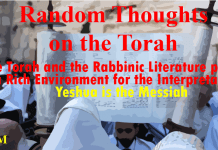While reading the bible, regardless of whether one is reading a translation or the original languages, we are all involved in the process of interpretation. While reading Genesis 6, many interpreters understand the בְּנֵ֤י הָֽאֱלֹהִים֙ “sons of God” to be angels who had fallen from their heavenly estate. Here on earth these fallen angels noticed the daughters of men (women) and took them, cohabiting with them, and producing offspring which were know as giants, half-human-half-angels. The offspring of this human-angelic sexual relations led to a hybrid-giant race of men who were called the Nephilim. These Nephilim corrupted the earth, causing God to send a Flood to wipe everyone out except Noah’s family who were those who had not been genetically tainted by the angelic sin. This is the basic premise of those who read the passages of Genesis 6 and Numbers 13. When we study all of scripture, I believe the fantastical interpretation is unnecessary, that the בְּנֵ֤י הָֽאֱלֹהִים֙ “sons of God” is a reference to men, not angels.
Comparison of the Hebrew (Masoretic text) and Aramaic (Targum Onkelos) texts.
Tanach (תנך) Hebrew Bible
|
ספר בראשית פרק ו פסוק א-ז א וַיְהִי כִּי-הֵחֵל הָאָדָם לָרֹב עַל-פְּנֵי הָאֲדָמָה וּבָנוֹת יֻלְּדוּ לָהֶם: ב וַיִּרְאוּ בְנֵי-הָאֱלֹהִים אֶת-בְּנוֹת הָאָדָם כִּי טֹבֹת הֵנָּה וַיִּקְחוּ לָהֶם נָשִׁים מִכֹּל אֲשֶׁר בָּחָרוּ: ג וַיֹּאמֶר יְהֹוָה לֹא-יָדוֹן רוּחִי בָאָדָם לְעֹלָם בְּשַׁגָּם הוּא בָשָֹר וְהָיוּ יָמָיו מֵאָה וְעֶשְֹרִים שָׁנָה: ד הַנְּפִלִים הָיוּ בָאָרֶץ בַּיָּמִים הָהֵם וְגַם אַחֲרֵי-כֵן אֲשֶׁר יָבֹאוּ בְּנֵי הָאֱלֹהִים אֶל-בְּנוֹת הָאָדָם וְיָלְדוּ לָהֶם הֵמָּה הַגִּבֹּרִים אֲשֶׁר מֵעוֹלָם אַנְשֵׁי הַשֵּׁם: פ [מפטיר] ה וַיַּרְא יְהֹוָה כִּי רַבָּה רָעַת הָאָדָם בָּאָרֶץ וְכָל-יֵצֶר מַחְשְׁבֹת לִבּוֹ רַק רַע כָּל-הַיּוֹם: ו וַיִּנָּחֶם יְהֹוָה כִּי-עָשָֹה אֶת-הָאָדָם בָּאָרֶץ וַיִּתְעַצֵּב אֶל-לִבּוֹ: ז וַיֹּאמֶר יְהֹוָה אֶמְחֶה אֶת-הָאָדָם אֲשֶׁר-בָּרָאתִי מֵעַל פְּנֵי הָאֲדָמָה מֵאָדָם עַד-בְּהֵמָה עַד-רֶמֶשֹ וְעַד-עוֹף הַשָּׁמָיִם כִּי נִחַמְתִּי כִּי עֲשִֹיתִם: | Genesis 6:1-7
6:1 Now it came about, when men began to multiply on the face of the land, and daughters were born to them, 6:2 that the sons of God saw that the daughters of men were beautiful; and they took wives for themselves, whomever they chose. 6:3 Then the Lord said, ‘My Spirit shall not strive with man forever, because he also is flesh; nevertheless his days shall be one hundred and twenty years.’ 6:4 The Nephilim were on the earth in those days, and also afterward, when the sons of God came in to the daughters of men, and they bore children to them. Those were the mighty men who were of old, men of renown. 6:5 Then the Lord saw that the wickedness of man was great on the earth, and that every intent of the thoughts of his heart was only evil continually. 6:6 The Lord was sorry that He had made man on the earth, and He was grieved in His heart. 6:7 The Lord said, ‘I will blot out man whom I have created from the face of the land, from man to animals to creeping things and to birds of the sky; for I am sorry that I have made them.’ (NASB) |
Targum Onkelos (תרגום אנקלוס) Aramaic Translation
|
תרגום אנקלוס ספר בראשית א וַהֲוָה כַד שָרִיאֻו בְנֵי אֲנָשָא לְמִסגֵי עַל אַפֵי אַרעָא״אדמתא״ וֻבנָתָא אִיתִילִידָא לְהוֹן׃ ב וַחזוֹ בְנֵי רַברְבַיָא יָת בְנָת אֲנָשָא אֲרֵי שַפִירָן אִינִין וֻנסִיבֻו לְהוֹן נְשִין מִכֹל דְאִתרְעִיאֻו״דאיתבחרו״׃ ג וַאֲמַר יוי לָא יִתקַיַים דָרָא בִישָא הָדֵין קְדָמַי לְעָלַם בְדִיל דְאִנֻון בִסרָא וְעוֹבָדֵיהוֹן בִישִין אַרכָא יְהִיב לְהוֹן מְאָה וְעַסרִין שְנִין אִם יְתֻובֻון׃ ד גִיבָרַיָא הְווֹ בְאַרעָא בְיוֹמַיָא הָאִינֻון וְאַף בָתַר כֵין דְעָלִין״די עלין״ בְנֵי רַברְבַיָא לְוָת בְנָת אֲנָשָא וְיָלְדָן לְהוֹן מנהון אִנֻון גִיבָרַיָא דְמֵיעָלְמָא״דמן עלמא אֲנָשִין דִשמָא״דשמן׃ ה וַחזָא וַגְלִי קדם יוי אֲרֵי סְגִיאַת בִישַת אֲנָשָא בְאַרעָא וְכָל יִצרָא הרהור מַחשְבָת לִבֵיה לְחוֹד בִיש כֹל יוֹמָא׃ ו וְתָב יוי בְמֵימְרֵיה אֲרֵי עֲבַד יָת אֲנָשָא אדם בְאַרעָא וַאֲמַר במימריה לְמִתבַר תֻוקפְהוֹן כִרעֻותֵיה׃ ז וַאֲמַר יוי אִמחִי יָת אֲנָשָא דִברֵיתִי די בראתי מֵעַל אַפֵי אַרעָא מֵיאֲנָשָא עַד בְעִירָא וְעַד רִחשָא וְעַד עוֹפָא דִשמַיָא אֲרֵי תְבִית תַבִית בְמֵימְרִי אֲרֵי עֲבַדתִינֻון׃ | Genesis 6:1-7
6:1 Now it came about, when men began to multiply on the face of the land, and daughters were born to them, 6:2 that the sons of God saw that the daughters of men were beautiful; and they took wives for themselves, whomever they chose. 6:3 Then the Lord said, ‘My Spirit shall not strive with man forever, because he also is flesh; nevertheless his days shall be one hundred and twenty years.’ 6:4 Heroes (strongmen) were in the land in those days and also those the sons of the master had sexual relations with the daughters of men and took possession of them, they being heroes (strong men) who were eternally famous. 6:5 Then the Lord saw that the wickedness of man was great on the earth, and that every intent of the thoughts of his heart was only evil continually. 6:6 The Lord was sorry that He had made man on the earth, and He was grieved in His heart. 6:7 The Lord said, ‘I will blot out man whom I have created from the face of the land, from man to animals to creeping things and to birds of the sky; for I am sorry that I have made them.’ (NASB) |
Here in the Aramaic translation, when comparing the Hebrew text, it is interesting that the word הַנְּפִלִים (Nephilim) is replaced with the word גִיבָרַיָא (Gibarayah) which is very close to the Hebrew word הַגִּבֹּרִים (Gibborim) meaning “mighty man” or “strong man.” Note that there is a close proximity of the Semitic languages Hebrew and Aramaic. Based on this simple analysis of the Aramaic and Hebrew texts shown above, the early rabbinic interpretation of the Nephilim is a name that is given to an ordinary man who had the extraordinary ability for making war. If we consider the context of these verses and the reason God destroyed the earth with a global flood, the reason that was given was because of the great wickedness of mankind that was throughout all of the earth (ה וַיַּרְא יְהֹוָה כִּי רַבָּה רָעַת הָאָדָם בָּאָרֶץ וְכָל-יֵצֶר מַחְשְׁבֹת לִבּוֹ רַק רַע כָּל-הַיּוֹם:, 6:5 Then the Lord saw that the wickedness of man was great on the earth, and that every intent of the thoughts of his heart was only evil continually. (NASB)) This verse provides the reason for the wickedness of men in those days. We know from history that when an army would make its way through to conquer a nation, the men of war would have their way with the women of the nation, they would rape and pillage, etc. We note that Israel’s army would not do these things. (Modern day example, today in the Sudan, the Muslim army’s rape, mutilate, and kill the women, of the land.) The wickedness of man in those days, in the days of Noah was so great, these mighty men of war would just take whatever woman they wanted, have their way with them, and possibly even destroy the women afterwards. These verses probably do not do justice to the extent of wickedness that was occurring in those days. Nevertheless, the point of these scriptures is that the Nephilim was a title that was given to mighty men of war. All the more reason why the people of Israel were afraid to go to war with the inhabitants of Canaan according to Numbers 13. We note that the Targum Onkelos is a rabbinic translation of the Torah, and most of the sages agree with this perspective, that the Nephillim were not fallen angels procreating with women.
Concerning the phrase “the Sons of God”
First, there are only four places total in the entire Tanakh where the exact phrase “בְּנֵ֤י הָֽאֱלֹהִים֙” is used as shown below:

We note that there is a mention of the sons of God in Job 38:7, however the definite article Ha is missing. What this demonstrates for us is that this term is not used consistently as reference to angels, and more specifically, that this term being only mentioned twice outside of the Genesis 6 does not necessarily establish this as a proof these are angels in Genesis 6.
ספר איוב פרק לח
ז בְּרָן־יַ֭חַד כּ֣וֹכְבֵי בֹ֑קֶר וַ֝יָּרִ֗יעוּ כָּל־בְּנֵ֥י אֱלֹהִֽים׃
Job 38:7
When the morning stars sang together, And all the sons of God shouted for joy?
The idea that “בְּנֵ֤י הָֽאֱלֹהִים֙” refer to angles is based upon context in the book of Job such as what we find here in Job 38:7. In addition to this, there is something that is of interest concerning the idea of man being called the sons of God. If we consider the following verses:
ספר שמות פרק ד
כב וְאָמַרְתָּ אֶל-פַּרְעֹה כֹּה אָמַר יְהֹוָה בְּנִי בְכֹרִי יִשְֹרָאֵל: כג וָאֹמַר אֵלֶיךָ שַׁלַּח אֶת-בְּנִי וְיַעַבְדֵנִי וַתְּמָאֵן לְשַׁלְּחוֹ הִנֵּה אָנֹכִי הֹרֵג אֶת-בִּנְךָ בְּכֹרֶךָ:
Shemot / Exodus 4:22-23
4:22 And thou shalt say unto Pharaoh, Thus saith the LORD, Israel is my son, even my firstborn: 4:23 And I say unto thee, Let my son go, that he may serve me: and if thou refuse to let him go, behold, I will slay thy son, even thy firstborn. (KJV)
ספר דברים פרק יד
א בָּנִים אַתֶּם לַיהוָֹה אֱלֹהֵיכֶם לֹא תִתְגֹּדְדוּ וְלֹא-תָשִֹימוּ קָרְחָה בֵּין עֵינֵיכֶם לָמֵת:
Devarim / Deuteronomy 14:1
14:1 Ye are the children of the LORD your God: ye shall not cut yourselves, nor make any baldness between your eyes for the dead. (KJV)
Here according to the Torah, in Shemot / Exodus 4:22-23 we read Moshe being instructed by the Lord to tell Pharaoh בְּנִי בְכֹרִי יִשְֹרָאֵל “Israel is my first born son.” We also read in Devarim / Deuteronomy 14:1 בָּנִים אַתֶּם לַיהוָֹה אֱלֹהֵיכֶם “You are the sons of the Lord your God.” In both of these instances, we find men being called the sons of God. So the idea is that there is a close parallel to this expression which unmistakably refers to men. Another example may be taken from Devarim / Deuteronomy 32:5-6.
ספר דברים פרק לב
ה שִׁחֵת לוֹ לֹא בָּנָיו מוּמָם דּוֹר עִקֵּשׁ וּפְתַלְתֹּל: ו הַלְיהוָֹה תִּגְמְלוּ-זֹאת עַם נָבָל וְלֹא חָכָם הֲלוֹא-הוּא אָבִיךָ קָּנֶךָ הוּא עָשְֹךָ וַיְכֹנֲנֶךָ:
Devarim / Deuteronomy 32:5-6
32:5 They have corrupted themselves, their spot is not the spot of his children: they are a perverse and crooked generation. 32:6 Do ye thus requite the LORD, O foolish people and unwise? is not he thy father that hath bought thee? hath he not made thee, and established thee? (KJV)
Here Moshe writes שִׁחֵת לוֹ לֹא בָּנָיו מוּמָם דּוֹר עִקֵּשׁ וּפְתַלְתֹּל literally “corrupt to him, not his sons, the are blemished, a generation crooked and perverse.” The same idea speaking to the people as being the sons of God, and God as being their Father, and their not behaving as righteous sins should behave. The prophet Hosea also describes Israel as being the sons of God, note what is written in Hosea 1:10 and 11:1.
ספר הושע פרק ב
א וְֽ֠הָיָה מִסְפַּ֤ר בְּנֵֽי־יִשְׂרָאֵל֙ כְּח֣וֹל הַיָּ֔ם אֲשֶׁ֥ר לֹֽא־יִמַּ֖ד וְלֹ֣א יִסָּפֵ֑ר וְֽ֠הָיָה בִּמְק֞וֹם אֲשֶׁר־יֵאָמֵ֤ר לָהֶם֙ לֹֽא־עַמִּ֣י אַתֶּ֔ם יֵאָמֵ֥ר לָהֶ֖ם בְּנֵ֥י אֵֽל־חָֽי׃
Hosea 1:10
1:10 Yet the number of the children of Israel shall be as the sand of the sea, which cannot be measured nor numbered; and it shall come to pass, that in the place where it was said unto them, Ye are not my people, there it shall be said unto them, Ye are the sons of the living God. (KJV)
ספר הושע פרק יא
א כִּ֛י נַ֥עַר יִשְׂרָאֵ֖ל וָאֹהֲבֵ֑הוּ וּמִמִּצְרַ֖יִם קָרָ֥אתִי לִבְנִֽי׃
Hosea 11:1
11:1 When Israel was a child, then I loved him, and called my son out of Egypt. (KJV)
Hosea 1:10 states בְּנֵ֥י אֵֽל־חָֽי “sons of the living God” and 11:1 state, וּמִמִּצְרַ֖יִם קָרָ֥אתִי לִבְנִֽי “and out of Egypt I called my son.” Here Hosea is referencing the sons of God as being the people of Israel. Again, this follows the same vein of thought, men can be called the sons of God. These things draw out an interesting point point, there may be two ways of referring to men on earth, one as not knowing God, the other as knowing God. Sons of God may be a secular reference, whereas the sons of the living God, or the sons of the “Lord God” refer to those who are His children by faith. Here the phrase sons of God definitely refer to humans and not angels. Some may argue that “בְּנֵ֤י הָֽאֱלֹהִים֙” cannot have a relationship with these other parallels due to their not being written explicitly as “בְּנֵ֤י הָֽאֱלֹהִים֙”. Regardless of the position one may take concerning this, these references from the Tanakh speak of the sons of God as being human beings. Consequently, based upon these texts, my premise is the Hebrew phrase “בְּנֵ֤י הָֽאֱלֹהִים֙” is not a technical expression for angels only.
ספר ישעיה פרק מג
ו אֹמַר לַצָּפוֹן תֵּנִי וּלְתֵימָן אַל-תִּכְלָאִי הָבִיאִי בָנַי מֵרָחוֹק וּבְנוֹתַי מִקְצֵה הָאָרֶץ:
Isaiah 43:6
43:6 I will say to the north, Give up; and to the south, Keep not back: bring my sons from far, and my daughters from the ends of the earth; (KJV)
ספר תהילים פרק פב
ו אֲנִי אָמַרְתִּי אֱלֹהִים אַתֶּם וּבְנֵי עֶלְיוֹן כֻּלְּכֶם:
Tehillim / Psalm 82:6
82:6 I have said, Ye are gods; and all of you are children of the most High. (KJV)
Here Isaiah 43:6 speaks of God bringing His son (הָבִיאִי בָנַי) from the North and South and the Psalms speaks saying you are all gods and all of God’s people being the sons of the Most High (אֲנִי אָמַרְתִּי אֱלֹהִים אַתֶּם וּבְנֵי עֶלְיוֹן כֻּלְּכֶם). Note also that Jeremiah 3:19 and 31:20 speaks of Israel being God’s son as well. Taking all of these things together suggests that the sons of God according to the Tanakh have a greater case of referring to men as opposed to angels.
Concerning the Word “Nephilim“
Notice there is only two places in which הַנְּפִלִ֞ים is actually transliterated (Bereshit / Genesis 6:4 and Bamidbar / Numbers 13:33). All of the remaining places this word is translated as normal and interestingly all of these references except for Tehillim / Psalms 145:14 is in reference to having fallen due to war.

The Ezekiel 32:24 reference, שָׁ֤ם עֵילָם֙ וְכָל־הֲמוֹנָ֔הּ סְבִיב֖וֹת קְבֻרָתָ֑הּ כֻּלָּ֣ם חֲלָלִים֩ הַנֹּפְלִ֨ים בַּחֶ֜רֶב אֲֽשֶׁר־יָרְד֥וּ עֲרֵלִ֣ים׀ אֶל־אֶ֣רֶץ תַּחְתִּיּ֗וֹת אֲשֶׁ֨ר נָתְנ֤וּ חִתִּיתָם֙ בְּאֶ֣רֶץ חַיִּ֔ים וַיִּשְׂא֥וּ כְלִמָּתָ֖ם אֶת־י֥וֹרְדֵי בֽוֹר׃ 32:24 “Elam is there, with all her hordes around her grave. All of them are slain, fallen by the sword. All who had spread terror in the land of the living went down uncircumcised to the earth below. They bear their shame with those who go down to the pit. (NIV) The description that we have in Ezekiel tends to follow along the narrative of the generation of Noah, exceedingly wicked, and worthy of destruction. It is interesting by inspection of these search results, 2 Kings 25:11, Jeremiah 39:9, Jeremiah 52:15, each of these have the direct object identifier (את) juxtaposed to the Nephilim indicating this is the object of the sentence. Notice the difficulty the English translators have in regard to this word.
ספר מלכים ב פרק כה
יא וְאֵת יֶתֶר הַעָם הַנִּשְׁאָרִים בָּעִיר וְאֶת-הַנֹּפְלִים אֲשֶׁר נָפְלוּ עַל-הַמֶּלֶךְ בָּבֶל וְאֵת יֶתֶר הֶהָמוֹן הֶגְלָה נְבוּזַרְאֲדָן רַב-טַבָּחִים:
2 Kings 25:11
And the rest of the people, those left in the city, and those falling who have fallen to the king of Babylon, and the rest of the multitude, Nebuzaradan chief of the executioners has removed; (LSV)
Here in 2 Kings 25:11, וְאֵת יֶתֶר הַעָם הַנִּשְׁאָרִים בָּעִיר “And the rest of the people, those left in the city,” וְאֶת-הַנֹּפְלִים אֲשֶׁר נָפְלוּ עַל-הַמֶּלֶךְ בָּבֶל “and those falling who have fallen to the king of Babylon”… Here the Nephilim הַנֹּפְלִים we see the definite article Ha, so this could be translated as the mighty men of War. But because this word הַנֹּפְלִים is so steeped in a tradition to translate as giant-angelic-human hybrid people, tradition prevents the translation as mighty warriors who have fallen to the army of Babylon. The point is, הַנֹּפְלִים (Nephilim) is a reference to man and not hybrid angelic people. In the next two references, the English translators really struggle with the English translation from the MSS.
ספר ירמיה פרק לט
אט וְאֵת יֶתֶר הָעָם הַנִּשְׁאָרִים בָּעִיר וְאֶת-הַנֹּפְלִים אֲשֶׁר נָפְלוּ עָלָיו וְאֵת יֶתֶר הָעָם הַנִּשְׁאָרִים הֶגְלָה נְבוּזַרְאֲדָן רַב-טַבָּחִים בָּבֶל:
Jeremiah 39:9
And the remnant of the people who are left in the city, and those defecting who have defected to him, and the remnant of the people who are left, Nebuzar-Adan, chief of the executioners, has removed [to] Babylon. (LSV)
ספר ירמיה פרק נב
טו וּמִדַּלֹּות הָעָם וְאֶת-יֶתֶר הָעָם | הַנִּשְׁאָרִים בָּעִיר וְאֶת-הַנֹּפְלִים אֲשֶׁר נָפְלוּ אֶל-מֶלֶךְ בָּבֶל וְאֵת יֶתֶר הָאָמֹון הֶגְלָה נְבוּזַרְאֲדָן רַב-טַבָּחִים:
Jeremiah 52:15
And of the poor of the people, and the remnant of the people who are left in the city, and those who are defecting, who have defected to the king of Babylon, and the remnant of the multitude, Nebuzar-Adan, chief of the executioners, has removed; (LSV)
We see in each case, in Jeremiah 39:9 וְאֶת-הַנֹּפְלִים אֲשֶׁר נָפְלוּ עָלָיו וְאֵת and in Jeremiah 52:15 וְאֶת-הַנֹּפְלִים אֲשֶׁר נָפְלוּ אֶל-מֶלֶךְ each of these verses are translated as defecting to the king of Babylon. Note again what appears to be the translator struggling with the translation in the repetition of “defecting.” It is important to note that here we find the word as a Qal participle mp absolute form. In the Bereshit / Genesis 6:4 and Bamidbar / Numbers 13:33 cases, the word is a noun, common mp absolute form where all the other cases are Qal participle mp. Note that Participles have three functions in sentences. They can be components of verb phrases, or they can function as adjectives or nouns. So it might be possible to translate as the “fallen ones” or the “mighty men of War” who were defecting or falling to the king of Babylon. The reason these mighty men of war were fallen was because the people had left their trust in the Lord and so their help and protection had been removed, just as the Torah declares will happen to those who do not listen and obey the God in heaven.









